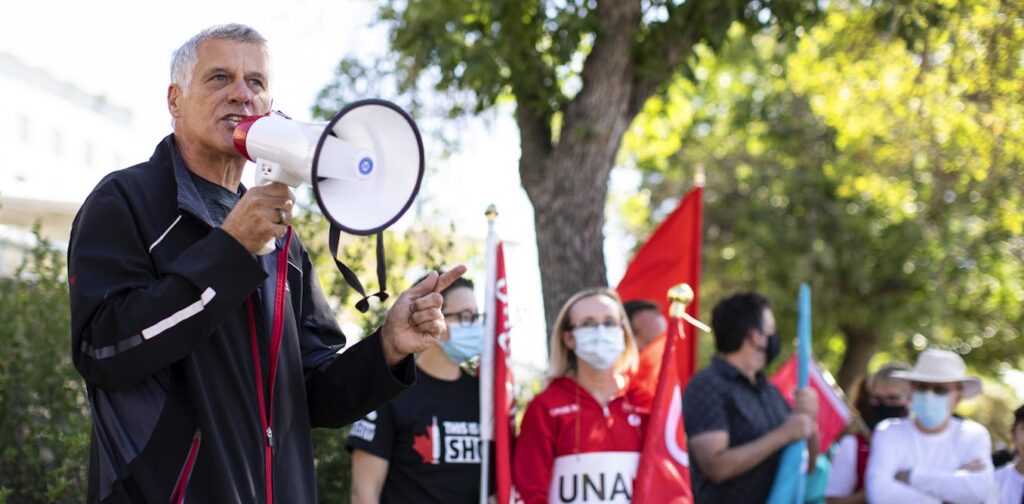More than 200,000 public sector workers in Alberta will begin negotiating new contracts with their employers in the coming months. The latest deal expires in March, leaving workers to ask for raises after years of high inflation and little wage growth.
The largest unions have already begun negotiations, with others expected to join later this spring, with negotiations expected to reach a climax in the fall.
These negotiations will involve workers in nearly every public service Albertans depend on, including health care and education. Also up for negotiation are post-secondary education and the state's core civil service services, including civil servants employed by the government and by various agencies, commissions and commissions.
What these negotiations have in common is that the state government makes decisions on behalf of the employer. As a result, negotiations at all tables are expected to become tense, with the possibility of actual labor disruption.
put your thumb on the scale
The Government of Alberta is beginning to engage in public sector negotiations in an unprecedented manner compared to previous provincial governments and all other provincial and territorial governments. It is likely that this will happen again in 2024.
This interference undermines the bargaining process and the relationship between workers and employers, resulting in an unfair deal for workers and their families.
In 2019, the United Conservative Party (UCP) passed the Public Sector Employers Act, allowing the Chancellor of the Exchequer to impose a bargaining obligation on all public sector employers and to dictate what deals they must negotiate. Became.

Canadian Press/Jason Franson
These obligations must be kept confidential at all times, both during and after negotiations. This means that employers can never reveal them to unions or the public. Alberta would be the first jurisdiction in Canada to impose such a secret mission.
in thumb on scalea report we wrote for the Parkland Institute at the University of Alberta, found that when these secret orders were first used in 2020, they made collective bargaining meaningless for public sector workers. I understand.
This report traces the history of government intervention in public sector bargaining in Canada and Alberta, and examines how recent forms of intervention, such as covert missions and the establishment of bargaining coordination offices, have affected collective bargaining. I am evaluating it.
Through interviews with union negotiators and former government officials, this report reveals what happened in the 2020 bargaining round and provides insight into what will happen this year.
secret mission
Union negotiators we spoke to explained that employers' hands are tied by secret orders. And the confidentiality of the mandate prevented employers from publicly disclosing these struggles. Only when negotiations break down and the union invokes forced mediation, the first step on the road to a work stoppage, is any major deal finalized.
This level of interference tipped the scales in the government's favor. The result is a dynamic erosion of trust between workers and employers that will have long-lasting effects beyond the current administration.
Governments are typically involved in public sector negotiations when they are either the employer or the employer's main funder, as is the case with health care workers.
But by using secret mandates, Alberta can control what happens at every bargaining table in the province without confronting workers or negotiating fairly. Public sector employees can never negotiate with the people making decisions.

Canadian Press/Jeff McIntosh
In the 2020 round of negotiations, the UCP used secret orders to try to force deep pay cuts of between 4 and 11 percent for public sector workers, with some making the cuts retroactive.
The challenges of COVID-19 derailed those plans, but workers were still forced to accept small pay increases that didn't come close to matching the soaring cost of living.
As we enter a new round of negotiations this spring and summer, public sector workers will understandably demand fair wages to keep up with rising costs. However, we expect the state to respond to demands for further concessions despite its large budget surplus.
Upcoming negotiation rounds
If the government tries to impose its political will through secret orders, future negotiations could be tough and could lead to work being halted. After years of underfunding, the stress of COVID-19 and a minimum wage increase, Alberta's nurses, teachers, health aides, social workers and public servants are demanding equity.
So far, the signs of the process are not encouraging. Employers at every table are presented with the same opening offer: 7.5 percent raises over four years, far short of recent inflation and what workers are asking for. Early signs indicate that the government intends to continue its behind-the-scenes intervention in public sector negotiations.
The government has a choice: meet face-to-face with public sector workers to find a fair deal, or try to once again impose anti-worker policies on those running the state.


